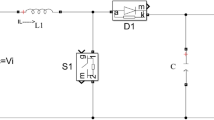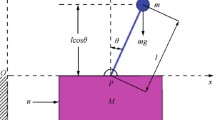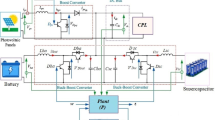Abstract
Due to wide input fluctuation with line frequency of 50 Hz, power-factor-correction (PFC) Boost converters tend to exhibit fast-scale instability over time domain. The traditional remedy is to impose slope compensation so as to weaken or eliminate this instability. A theoretical principle on the implementation of slope compensation signal is still lacking. Empirical design will induce over compensation frequently, resulting in a large decrease of power factor. In order to tackle this issue, by constructing the discrete-time iterative map of the PFC Boost converter from the viewpoint of bifurcation control theory of nonlinear systems, consequently, the criterion of critical stability for the PFC circuit can be established. Based on this stability criterion, appropriate design of slope compensation can be achieved. Our work indicates that 3 main circuit parameters (i.e. switching cycle, output reference voltage and inductor) determine the effective amplitude design of the slope compensation signal. The results, validated by a large quantity of analytical and numerical studies, show that appropriate slope compensation can be effective in weakening (or controlling) fast-scale bifurcation while maintaining a rather high input power factor.
Similar content being viewed by others
References
Tse C K. Circuit theory of power factor correction in switching converters. Int J Circuit Theory Appl, 2003, 31(2): 157–198
García O, Cobos J A, Prieto R, et al. Single phase power factor correction: a survey. IEEE Trans Power Electr, 2003, 18(3): 749–755
Redl R. Power factor correction in a single-stage switchingmode power supplies-an overview. Int J Electron, 1994, 77(5): 555–582
Tse C K. Complex Behavior of Switching Power Converters, Boca Raton: CRC Press, 2003. 201–216
Dranga O, Tse C K, Iu H H C, et al. Bifurcation behavior of a power-factor-correction Boost converter. Int J Bifur Chaos, 2003, 13(10): 3107–3114
Mazumder S K. Theoretical and experimental investigation of the fast and slow-scale instabilities of a DC-DC converter. IEEE Trans Power Electron, 2001, 16(2): 201–216
Zou J L, MA X K. Experimental study of fast-scale bifurcations in PFC Boost converters (in Chinese). Proc CSEE, 2008, 28(12): 38–43
Ma X K, Liu W Z, Zhang H. Analysis of fast-scale bifurcation and chaos phenomena in Boost PFC converter (in Chinese). Proc CSEE, 2005, 25(5): 61–67
Iu H H C, Zhou Y, Tse C K. Fast-scale instability in a PFC boost converter under average current mode control. Int J Circuit Theory Appl, 2003, 31(6): 611–624
Wu X, Tse C K, Dranga O, et al. Fast-scale instability of single-stage power-factor-correction power supplies. IEEE Trans Circ Syst I, 2006, 53(1): 204–213
Zou J L, Ma X, Tse C K, et al. Fast-scale bifurcation in powerfactor-correction buck-boost converters and effects of incompatible periodicities. Int J Circuit Theory Appl, 2006, 34(3): 251–264
Wu X, Tse C K, Wong S C, et al. Fast-scale bifurcation in single-stage PFC power supplies operating with DCM boost stage and CCM forward stage. Int J Circuit Theory Appl, 2006, 34(3): 341–355
Zhou Y, Jiang X, Chen J. Analysis of complex intermittency in Boost converter from a bifurcation control viewpoint. Sci China Ser F-Inf Sci, 2008, 51(12): 2135–2149
Tse C K, Lai Y M. Controlling bifurcation in power electronics: a conventional practice re-visited. Latin Am Appl Res, 2001, 31(3): 177–184
Author information
Authors and Affiliations
Corresponding author
Additional information
Supported by the National Natural Science Foundation of China (Grant Nos. 60402001, 60672023), and the Science and Technological Fund of Anhui Province for Outstanding Youth (Grant No. 08040106807)
Rights and permissions
About this article
Cite this article
Zhou, Y., Huang, J., Wang, S. et al. Principle of designing slope compensation in PFC Boost converter. Sci. China Ser. F-Inf. Sci. 52, 2226–2233 (2009). https://doi.org/10.1007/s11432-009-0178-6
Received:
Accepted:
Published:
Issue Date:
DOI: https://doi.org/10.1007/s11432-009-0178-6




